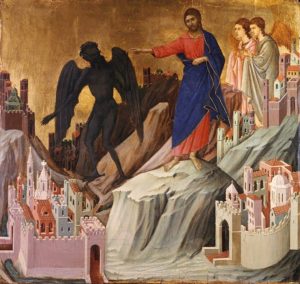
First Sunday of Lent
Fr. Mark Gatto
Preached: March 1, 2020
Evil. We do not need to look far in human history or in our world news to see the reality of evil within our world.
One of my favourite TV shows this year is called Evil. Not sure if any of you have seen it. In the show there is a Catholic seminarian who is working as part of an assessment team for the Catholic Church. They investigate purported supernatural incidents. Working with the seminarian is a skeptical forensic psychologist, she is a lapsed Catholic, and a contractor who is not a believer and is responsible for investigating scientific explanations for these incidents. Together this team assesses cases of reported miracles, demons, possession and so on. It is a simple TV show, but it does creatively reflect on the reality of evil as it enters human lives in different ways.
Our Catholic Faith accepts that evil exists, and we are all capable of evil. So, it is important for us to understand the reality of evil, the roots of evil. We should face it openly, otherwise it finds a way to sneak into our lives and into our institutions. As we have seen so clearly these past years, evil is able to enter the church as well.
On this First Sunday of Lent, the Church gives us a set of readings that all reflect on the reality of evil, provide insights into evil. It gives images of evil as a serpent, as the devil. But, the underlying insights are what really matter in these stories.
First, the story of the Fall from the Book of Genesis. This is such an insightful story revealing much about the psychology of sin and evil. After the creation of the man and woman who are in the garden of Eden, we see sin and evil enter the world. The serpent tempts the woman by convincing her that she is entitled to more. Instead of being grateful for all that she has, the woman is focused on what she does not have, what she is not able to have. Sin and evil so often enters our lives when we stop being grateful, when we are obsessed with what we do not have. Then we begin to be resentful and feel we have the right to do whatever in order to get something.
Next, she brings the man into this and gives some to him. Again, when we fall into evil ways we often try to bring others along with us. We justify our behaviour by having others join us. The result of the evil is that they are full of shame, they have to cover themselves up afraid to be seen. We know our behaviour is falling into sin and evil when we need to hide, to cover it up. Later in the story we will see the woman blaming the serpent and the man blaming the woman. Again, our tendency to blame others instead of taking responsibility for what we do.
This story in Genesis is a very insightful study of the reality of evil and how it enters our human lives.
In the Gospel, we see the story of the Temptation of Jesus in the desert. Instead of the image of the serpent, there is the image of the devil tempting Jesus before he begins his ministry. The Temptation to follow a path different from the path of God. Instead of self-sacrificing love to embrace power. Jesus is tempted to follow a path so often followed by leaders in this world, the way of power, success and domination. But, Jesus is called to a path of love and the gift of his very self. All of us can be tempted to choose power over others rather than service, to want to be successful in the eyes of others rather than do what is right, to win rather than to do what is good and true.
It is important for us to understand the reality of evil. To realize that we are capable of evil, that others are capable of evil, that our institutions are capable of evil, including the church. This keeps us awake and keeps us honest with ourselves.
Evil enters our lives when we stop being grateful for what we have and become focused ongetting what we do not have. Evil enters our lives when we give into lies, rationalizing, blaming others.
Evil always enters our lives through falsehoods, lies, lack of truth. The greatest way to avoid evil is utter honesty. Be ruthlessly honest with yourself and with others. Lies are like opening a door that allows evil to enter our lives and our institutions.
Evil is a reality, understand it and face it honestly. Do not be afraid of evil, for evil has no power except what we give it. Evil has no power at all when faced with truth and honesty.

